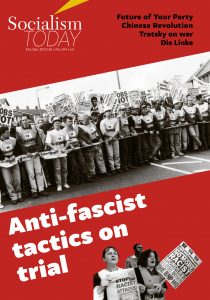As Russia’s invasion of Ukraine nears its fourth anniversary, is Donald Trump right to dismiss what is still a not insignificant global power as a ‘paper tiger’? CHRISTINE THOMAS reviews two recent books asking, how powerful is Putin? While, on page 24, we reprint a 1995 article explaining the roots of Russia’s great power aspirations in the capitalist regime established as the Stalinist dictatorship disintegrated from the late 1980s.
Russia under Putin: Fragile State and Revisionist Power
Edited by Andrew S Natsios
Published by John Hopkins University Press, 2025, £39.40
Perfect Storm
By Thane Gustafson
Published by Oxford University Press, 2025, £22.99
Russia’s invasion of Ukraine in 2022 – unleashing the most serious war on European soil since the second world war – together with Trump’s re-election in the US, has raised fears about escalating violence and bloodshed in Europe in particular, but also more widely, and even the possibility of a nuclear exchange.
Mark Rutte, general secretary of NATO, has argued that Russia could be ready to attack NATO within five years. President Emmanuel Macron of France has declared that Russian aggression “knows no borders” and will not stop at Ukraine, while the Estonian prime minister, Kaja Kallas, has warned that a Russian war “on the West” is coming in the next decade. All have backed a massive increase in arms expenditure in Europe in order to combat what is being presented as an imminent Russian threat.
And after a disastrous initial invasion, and a long, drawn-out war of attrition, Russia now appears to have consolidated its position in the war in Ukraine. But just how strong is Russia under Vladimir Putin? Two recently published books, Perfect Storm, and Russia under Putin (a collection of essays) offer some useful material to help answer that question.
Read more →



